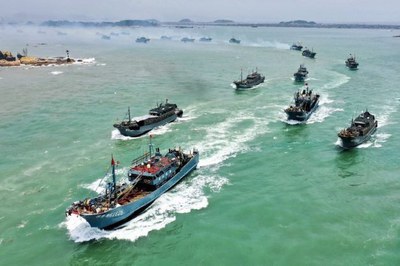Webinar - The Impacts of Distant Water Fishing Fleets on National Food Security

Webinar Description:
DWFs are vessels that fish far from their home waters, often within the national waters of other countries. They have been identified as one of many challenges to recovering or sustainably managing fish stocks. In particular, these heavily-subsidized industrial fleets may decrease fish availability for small-scale fishers, reduce revenue to local economies, and diminish opportunities for fisheries to address domestic food and nutrition needs. As a result, many governments around the world have identified DWFs as a key threat and priority for further research. Though new data sources have improved our understanding of where DWFs are fishing and what they’re catching, questions remain regarding the pathways by which these fleets may be affecting food security and the extent of those effects.
To explore these questions, researchers from URI investigated four cases where DWFs and local fishers interact: Jumbo Squid in Peru; a multi-species tuna stock in Madagascar (webinar for Peru & Madagascar on April 11); Round Scad in the Philippines; and Skipjack Tuna in the Pacific Islands region (webinar for the Philippines & Pacific on April 12). Researchers estimated the contribution that each fish species currently makes to local nutritional needs and how potential shifts in management of DWFs could influence local food security. Their results highlight minerals and nutrients important for human health and prevalent in aquatic foods, for example, calcium and iron. The research drew from existing datasets on fish landings, nutritional content, national-level nutrition indices, and key informant interviews regarding the interactions between DWFs and small-scale fleets. Taken together, results will speak to the multi-faceted nature of relationships between DWFs, local catches by domestic fleets, data availability, and access to fish.
Join us to share your insights as we discuss these research findings and consider the implications. In particular, we are hoping to incorporate input from global and local experts, identify any additional relevant datasets or analytical approaches, and consider strategies for making the results accessible and relevant to decision-makers.
This research was conducted by the USAID-funded Feed the Future Innovation Lab for Fish to help implement USAID’s Distant Water Fleet Research Agenda, which aims to uncover responsive actions related to the drivers and impacts of DWF on national fisheries and fisherfolk.
This webinar is for USAID staff, implementers, and partners.

